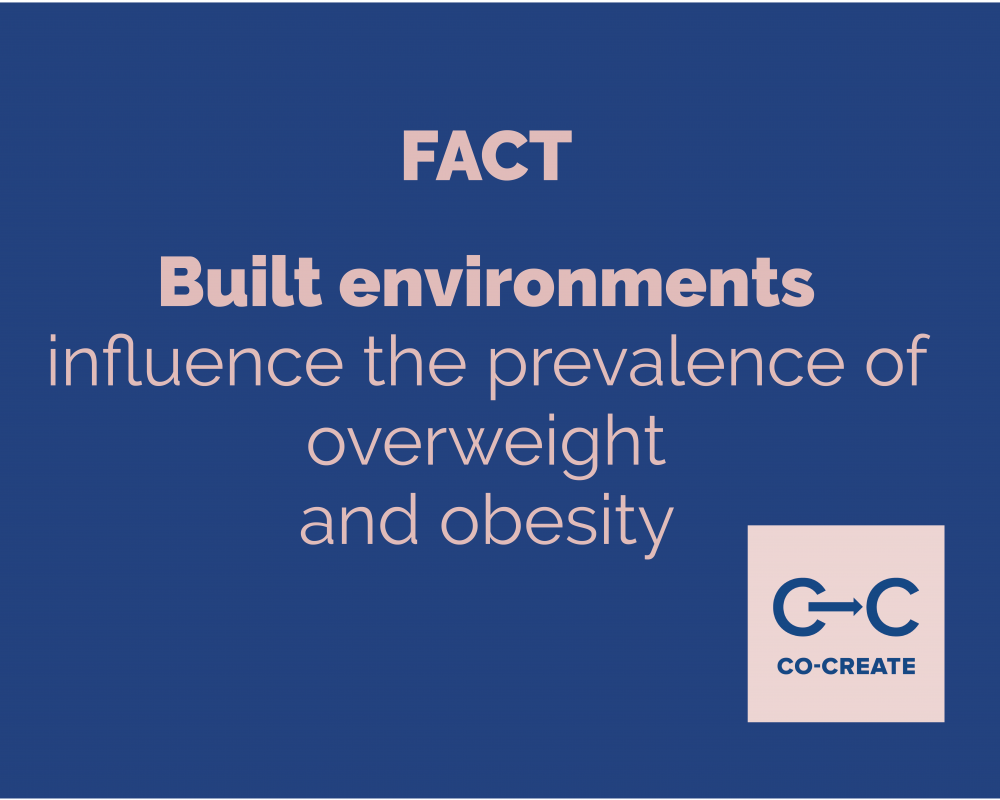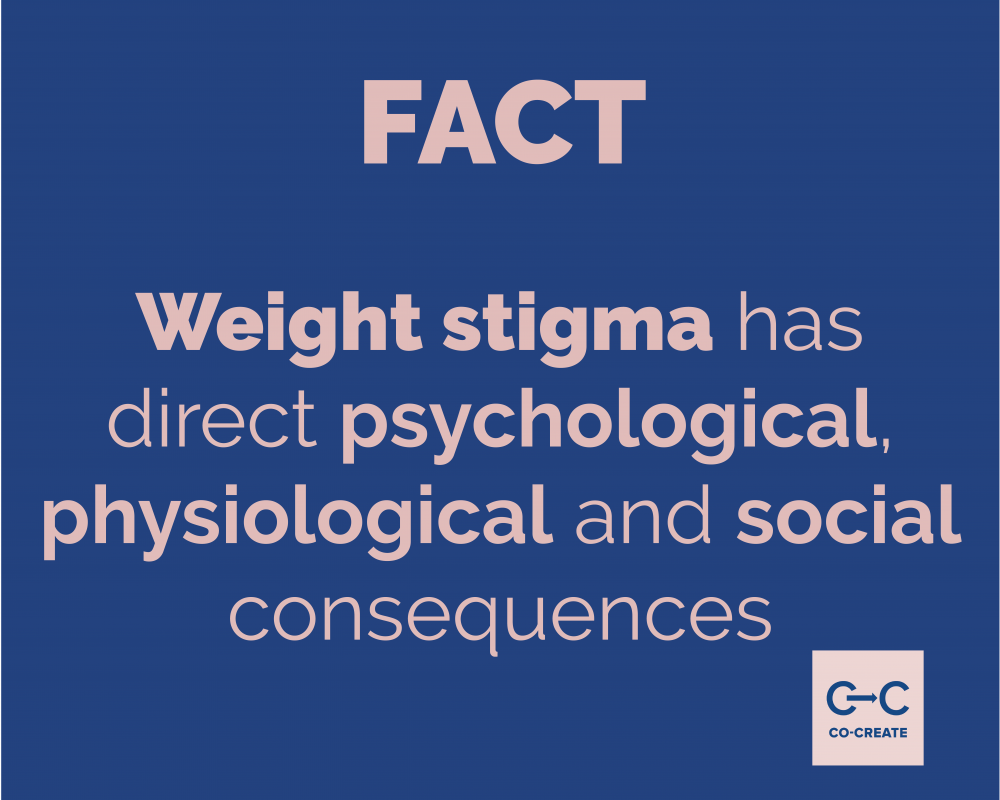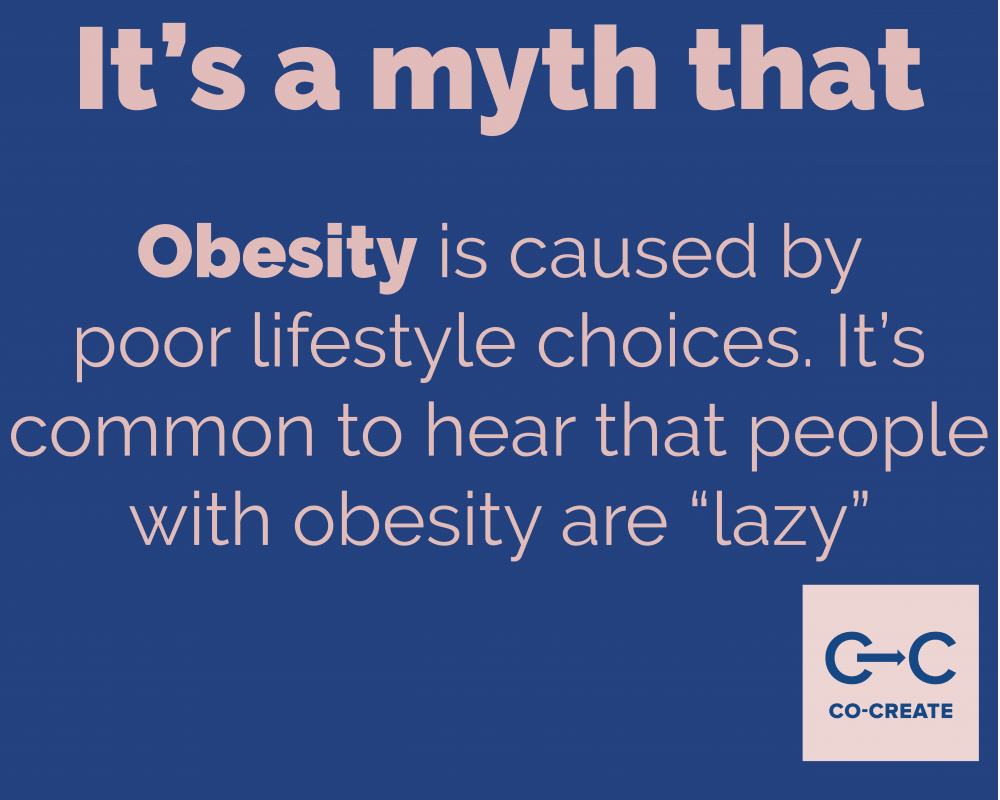Facts & Myths
Social media can be used positively to impact youth health, but it can be hard to separate the facts from the myths, particularly in relation to overweight and obesity. Facts are evidence based in science, whereas myths communicate inaccurate information that often create or reinforce harmful stereotypes. Here at Healthy Voices, we are empowering young people to be an agent for change in the youth health agenda. To help you with this mission we have presented some common facts and myths related to overweight and obesity. Scroll down to learn more!

Our environments have a direct impact on rates of overweight & obesity
Did you know that childhood obesity has been increasing all across Europe? In fact, estimates show that by 2025, one in every five children will be living with overweight or obesity! Current efforts to try and halt these trends have very much been focused on individual-level treatments. However, as has been shown a number of times, obesity is in fact a very complex disease and is strongly influenced by our social, physical and economic environments.
Today, we are constantly surrounded by high-calories, cheap food often high in fat sugar and salt. In fact, our supermarkets often promote their consumption through tactical product placement strategies.
Have you also noticed seeing junk food advertisements appear on your Instagram, Facebook or Twitter feeds? As we now live in a digitalised world, we are also constantly targeted via food adverts that often, without us being aware of it, affect our food preference and choices.
The area we live in also plays a huge role with regards to affecting the prevalence of overweight and obesity. Indeed, factors such as crime rates, the walkability and public transport system of a town or a city directly influences our ability to engage in physical activity.
Overweight and obesity is the result of complex system interactions and while we need to change this for you, we need to do it in collaboration with you. We need to move away from a focus on single-level interventions and move towards developing comprehensive policies!
Join us to address the personal, societal and economic impacts of obesity. Make your voice heard, make your voice matter!
Follow WorldObesityDay and @EU_COCREATE on Twitter and @cocreate_eu on Instagram for regular updates about how to get involved!
#WorldObesityDay #YouthMatter #Youth4CC #CC4EU

Weight Stigma
Images used in online media often depicts people living with obesity in a stigmatising way, increasing feelings of blame and implicating individual responsibility. This creates an environment of shame and guilt which we urgently need to steer away from. Given the power of media today, we need to be increasingly careful about the type of images and language we use.
Weight stigma refers to negative behaviours and attitudes that are directed towards individuals solely on the basis of their weight. Negative and inaccurate stereotypes associated with weight include depictions of laziness, lack of will power, a lack of moral character, bad hygiene, low levels of competence and intelligence and unattractiveness.
Unfortunately, stigma surrounding one’s weight is still very widespread and certain stereotypical characteristics often associated with overweight and obesity remain very prominent. These include laziness, lack of willpower, a lack of moral character, bad hygiene, low level of intelligence and unattractiveness. Importantly, overweight and obesity is often identified as an individual’s personal responsibility, despite the fact that the evidence increasingly stresses that obesity is a multifaceted disease with multiple causes.
For the following reasons, it is urgent that we stope weight stigma:
- Stigma does not just have emotional effects. Because of the fear of being stigmatised, many people avoid seeking medical care which can have severe physical effects. In some cases, it can also lead to disordered eating behaviours, mood and anxiety disorders.
- Stigma can also impact people’s social lives and relationships. Due to the fear of being stigmatised, people engage in social isolation and avoid social situations.
- Weight stigma can be internalised. Many people who have experienced weight stigma feel powerless to challenge it. This can therefore lead to individuals believing that the negative stereotypes attributed to them are true, and therefore that they deserve such stigmatisation.
- The stereotypical and widely perceived causal attributes of obesity such as laziness and overeating play an integral role in the generation of weight bias.
- Media are one of the main perpetrators when it comes to the stigmatisation of weight. Many online media and stories contain negative stereotypes that are often portrayed through negative language and images. To avoid that, make sure to take a look at the World Obesity Federation’s image bank which offers many non-stigmatising images, are completely free to use and easy to download.
It is urgent more than ever that we break the cycle of shame our environments are perpetuating.
Make your voice heard, make your voice matter!
Follow @WorldObesityDay and @EU_COCREATE on Twitter and @cocreate_eu on Instagram for regular updates about how to get involved!
#YouthMatter #Youth4CC

Obesity - a complex challenge with multiple causes
Across Europe, childhood obesity is on the rise. It is predicted that by 2025, one in every five children will be affected by overweight and obesity. In addition to these alarming trends, adolescent overweight and obesity is a strong predictor of adulthood obesity and increases the risk for a range of diseases such as type-2 diabetes, hypertension, heart diseases and certain types of cancers.
Often, overweight and obesity is brought down to a simple “calories in vs calories out” equation, accentuating individual responsibility. As highlighted through the CO-CREATE project, what we eat and how much we move are direct results of some of these individual choices, and current prevention efforts have been increasingly focused on trying to influence these choices as if they were conscious and rational. However, it is much more complex and our so-called choices are strongly influenced by the social, physical and economic environments in which we live.
We are surrounded with easy access to cheap, high in fat, sugar and salt ultra-processed foods. Our work places and urban environments promote sedentary lifestyles. The combination of all of these factors makes unhealthy choices the default choices. As highlighted through research, and consistently emphasised through CO-CREATE, people’s nutrition and physical activity behaviours are influenced by complex sets of contextual elements. If we want to successfully reduce the prevalence of overweight and obesity, we need to move away from this individual-level focus and move towards developing and implement comprehensive policies addressing our food and physical activity systems and environments, reshaping the context to make healthy choices the easiest and most widely preferred.
As initially highlighted through the Foresight Report, obesity results from multiple interacting influences. CO-CREATE uses the same train of thought and adopts a systems approach to address adolescent obesity and looks at the bigger picture to explore the complex, ‘messy’ influences on diet and physical activity that must be considered to generate effective public health and other policies. In collaboration with youth around Europe, CO-CREATE is developing systems map to depict just that.
If we truly want to halt the rise in childhood and adolescent obesity, it is now urgent more than ever to break the cycle of shame and blame our systems are perpetuating. Join us to address the personal, societal and economic impacts of obesity.
Make your voice heard, make your voice matter!
Follow @WorldObesityDay and @EU_COCREATE on Twitter and @cocreate_eu on Instagram for regular updates about how to get involved! #YouthMatter #Youth4CC
